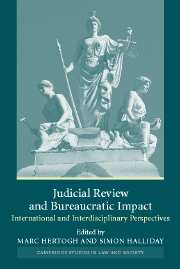Book contents
- Frontmatter
- Contents
- Acknowledgments
- Notes on the contributors
- Introduction
- Part One Conceptual and methodological issues
- Part Two International case studies
- 4 Impact studies in the United Kingdom
- 5 The politics of soft law: how judicial decisions influence bureaucratic discretion in Canada
- 6 The operation of judicial review in Australia
- 7 Legalising the unlegaliseable: terrorism, secret services and judicial review in Israel 1970–2001
- 8 Implementing court orders in the United States: judges as executives
- Part Three The future of judicial review and bureaucratic impact
- Bibliography
- Index
4 - Impact studies in the United Kingdom
from Part Two - International case studies
Published online by Cambridge University Press: 29 July 2009
- Frontmatter
- Contents
- Acknowledgments
- Notes on the contributors
- Introduction
- Part One Conceptual and methodological issues
- Part Two International case studies
- 4 Impact studies in the United Kingdom
- 5 The politics of soft law: how judicial decisions influence bureaucratic discretion in Canada
- 6 The operation of judicial review in Australia
- 7 Legalising the unlegaliseable: terrorism, secret services and judicial review in Israel 1970–2001
- 8 Implementing court orders in the United States: judges as executives
- Part Three The future of judicial review and bureaucratic impact
- Bibliography
- Index
Summary
INTRODUCTION
This chapter is designed to provide a brief overview of the empirical research conducted on the impact of judicial review on bureaucratic decision-making in the UK. While both impact and judicial review are terms which require further definition, an extensive analysis has been provided in Part 1 of this volume and there is therefore no need to dwell too long on matters of definition here. Nonetheless, before describing the existing research, it is necessary to place both judicial review and impact within a UK context, and the first part of this chapter provides some introductory background. The second part then presents a brief survey of the relevant research in the UK, and the third part further analyses some of the data to emerge from a study conducted by the author and a colleague in 1997–9. Finally, the fourth part considers how far these findings can be applied in other decision-making contexts. A concluding part indicates some possible ways forward for impact research in the UK.
SETTING THE CONTEXT
Judicial review
The purpose of judicial review
As is abundantly evident from other contributions to this volume, judicial review not only performs different formal tasks within different jurisdictions and constitutional arrangements, but it is also the subject of different aspirations and expectations. There is no universally agreed purpose of judicial review. Certainly in the UK the fundamental justification for judicial review is hotly contested. This theoretical uncertainty, however, need not inhibit empirical investigation.
- Type
- Chapter
- Information
- Judicial Review and Bureaucratic ImpactInternational and Interdisciplinary Perspectives, pp. 103 - 128Publisher: Cambridge University PressPrint publication year: 2004
- 6
- Cited by

